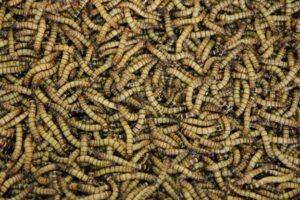21 Sep 2022 Edible Insects: What’s the Latest on Food Safety?
Usually, British food businesses are expected to do whatever they can to keep creepy crawlies out of the food chain. But recently, insects are heralded as a wonder-food product that can simultaneously improve our health and that of our planet. Spouted as a way for us to get our all-important protein requirements whilst saving the planet, edible insects are gaining popularity.
Research suggests that insect protein has the greatest potential to reduce food-related carbon footprints. So much so, that even environmentally conscious vegans are apparently tempted. With 25% of consumers happy to try edible insects, it looks like this is an area to watch out for in the UK food industry.
Which insects can we eat?
Edible insects in the current UK food market include crickets, flies and species of worm. They can be sold whole or manufactured into products including burgers, bars, snacks, pasta and speciality food ingredients like flours and powders.
Is it safe to eat insects?
We don’t recommend popping out to the garden to hunt down your next snack, but the consumption of the insects listed above certainly appears to be safe. Edible insect products have been available in the UK for some time, and when the UK left the EU changes to the availability of edible insects took place so that our regulatory bodies could provide assurances and regulations related to the safety of insect products.
The FSA has proposed to allow previously available edible insect products to remain on sale whilst they undergo the Novel Foods Authorisation Process. This process assesses the safety of foods to determine whether they can remain on the market long-term.
Regarding the decision, FSA Policy Director, Rebecca Sudworth, said:
“Our proposals will help businesses that have been affected by the uncertainty around insects for human consumption since the end of December 2020.
“When we left the EU, the transitional measures relating to novel foods including edible insects were not amended to require businesses to submit applications to Great British regulators.
“Edible insect products will need to pass through the full authorisation process in Great Britain to remain on the market, so we encourage businesses to talk to us about getting their applications in and the support we can provide through the process.
“We want anyone with an interest in edible insects, particularly trade organisations and food businesses, to have their voice heard through our consultation.”
Which edible insect products are currently legally available in the UK

Photo by Robert Gunnarsson on Unsplash
If edible insect products were marketed in the UK prior to 1st January 2018 and were the subject of an application to the EU for authorisation as a novel food by 1st January 2019 they can remain legally on the market until the results of the novel food assessment.
What are the risks associated with edible insects?
A generalised risk assessment that was conducted by the FSA and FSS found low safety risks associated with edible insects and products manufactured from them. They recommend appropriate safety measures that include:
- Implementing Hygiene Measures during the rearing of insects intended for the food chain
- The use of heat treatment to control the risk of Foodborne Illness
- Employing the use of Allergy Labelling
Back in 2015, the European Food Standards Agency (EFSA) judges that non-processed insects, when fed with approved feed materials, pose no special risks to human health when either consumed directly or when used as feed for livestock intended for the food chain.
That said, all involved in Food Safety standards should welcome all and any interest and investigation into the safety of edible insect products. The safety risks of eating insects will depend largely on the specific species of insect, how they are reared or collected, how and what they are fed and the methods used in processing them. A thorough investigation into these issues will help inform policy and procedures for the handling and manufacture of this novel food and is a necessary step in safeguarding consumers.
Developing regulatory frameworks is a lengthy process, but one that’s necessary so as not to undermine the importance of strict regulatory standards in food safety.
For more food safety insights, follow us on Twitter.










